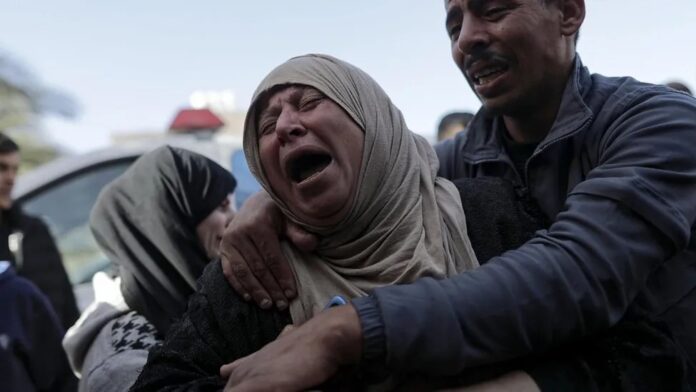The conflict between Israel and Hamas in the Gaza Strip reached a critical point on Friday night as Israel’s bombardment continued unabated, with reports of sustained air strikes and ground attacks. The Nuseirat refugee camp in central Gaza bore the brunt of the assault, resulting in a tragic loss of at least 18 lives, according to Palestinian media.
In a distressing turn of events, residents of the Bureij camp were ordered by the Israeli army to evacuate, compelling them to move south as the ground offensive intensified. The humanitarian situation in Gaza further deteriorated with reports of an air strike destroying a water treatment plant in Jabalia, exacerbating the already dire conditions faced by the local population.
Amidst the intensifying violence, the UN Security Council convened in New York to address the humanitarian crisis in Gaza. While a resolution was adopted, urging more humanitarian aid for the region, it fell short of calling for an immediate ceasefire in the ongoing conflict. The resolution reflects the complexities of the diplomatic negotiations, with divergent positions among Security Council members.
Wafa, the official Palestinian news agency, reported the tragic consequences of the air strike on Nuseirat, emphasizing the high human cost of the conflict. The Palestine Red Crescent Society reported air strikes near Al-Amal Hospital in Khan Younis, underscoring the impact on essential infrastructure and medical facilities.
Displaced individuals in Gaza expressed their desperation as they faced the challenges of survival. Ziad, a medic and father of six, questioned where they could go for safety, highlighting the lack of secure spaces for civilians in the conflict zone. Walaa al-Medini, a wheelchair user injured in a strike on her home, described the dire conditions, stating, “This is not a life: no water, no food, nothing.”
International humanitarian organizations, including Doctors Without Borders, decried the toll on civilian infrastructure, noting that Israel’s “indiscriminate strikes” had turned parts of Gaza into rubble. The World Food Programme’s alarming assessment that approximately 500,000 people in Gaza face “catastrophic hunger conditions” emphasizes the urgent need for international assistance.
The conflict began on October 7 when Hamas fighters crossed into Israel, resulting in a significant escalation of hostilities. The toll on the Gaza Strip has been devastating, with over 20,000 people killed and 50,000 injured, according to the Hamas-run health ministry.
Israel’s military, while expressing regret for civilian casualties, has consistently blamed Hamas for operating in densely populated areas or using civilians as human shields—a claim vehemently denied by the group.
As the UN Security Council grapples with finding a consensus to address the escalating crisis, the immediate focus remains on providing urgent humanitarian aid to alleviate the suffering of the people caught in the crossfire. The absence of a clear call for an immediate ceasefire underscores the challenges in finding a diplomatic resolution to the longstanding conflict, leaving the fate of civilians in the region hanging in the balance.

